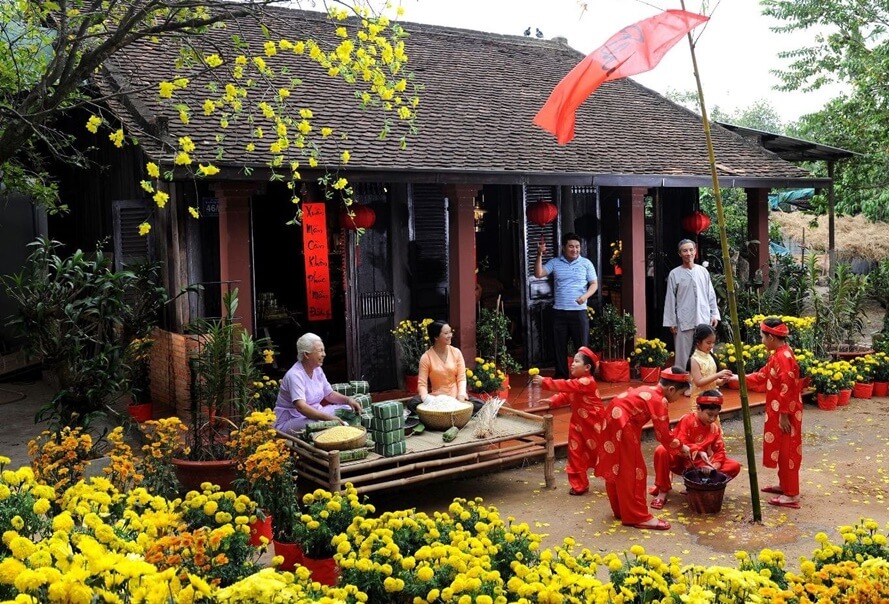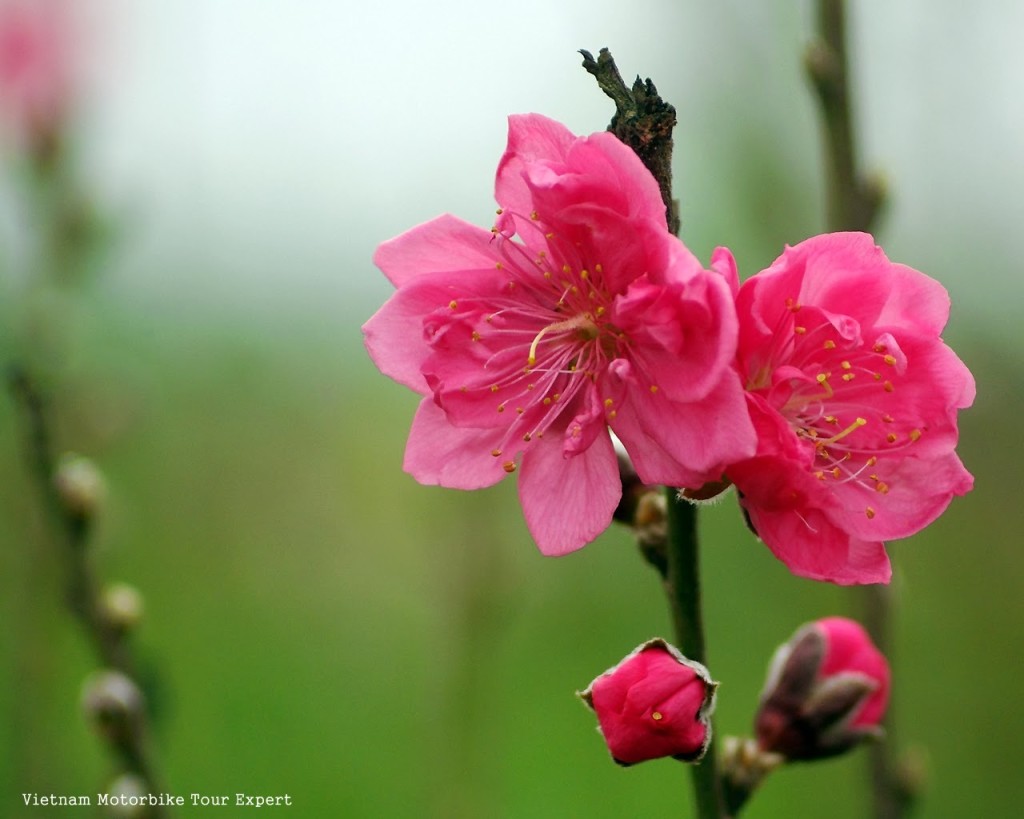Tet – The Vietnamese New Year Festival
 Lunar New Year is the most important and the oldest holiday in Vietnam, with the widest range of popular. This celebration is according to the cultural influence of the Chinese Lunar New Year and the East Asian cultural sphere. Tet is a shortened for Tet Nguyen Dan, which in Vietnamese means “Feast of the First morning of the First day” (The most important Vietnamese new year festival).
Lunar New Year is the most important and the oldest holiday in Vietnam, with the widest range of popular. This celebration is according to the cultural influence of the Chinese Lunar New Year and the East Asian cultural sphere. Tet is a shortened for Tet Nguyen Dan, which in Vietnamese means “Feast of the First morning of the First day” (The most important Vietnamese new year festival).
According to the folk beliefs: “Sunny or rainy is all thanks to the God”, Tet is an occasion for farmers to honor the Gods that grant them the fruitful harvests such as the Sun, the Rain, the Thunder, Water god,etc.
Tet is a family holiday. Vietnamese has a tradition that every year, on this occasion, despite how far they live away from home, people will come home for Tet, come home for family reunion even just for three days of Tet. People worship at the family altar or pay visits to ancestors’ graves in hometown as a sign of respect.
Tet in Vietnamese can be divided into three periods, known as Before Tet ; Tất Niên (penultimate New Year’s Eve) and Giao Thừa (New Year’s Eve), and Tân Niên (the New Year), representing the preparation before Tet, the eve of Tet, and the days of and following Tet, respectively.
This period begins one or two weeks before the actual celebration. The general atmosphere leading up to Tết is in the bustle of shopping, decorating the home, cooking traditional Tết food and waiting for relatives to return home. People try to pay off their debts in advance so that they can be debt-free on Tết. Parents buy new clothes for their children so that the children can wear them when Tết arrives. In the days leading up to Tết, the streets and markets are full of people. As the shops will be closed during Tết, people try to stock up on supplies as much as possible.
According to traditional custom, December 23rd of Lunar calendar is the day we see off Tao Quan – Kitchen Gods (the guardians of the family) to go back to heaven and report about the past year to Jade Emperor. Every family prepares a see off banquet for the Kitchen gods which includes many complicated dishes. People also release carps as they believe Tao quan will ride them to heaven.
You can really feel the holiday spirit from this day to Tet. People return to their hometown, shop for new clothes, shop for food and try to pay all the debts as they believe that let debts from the previous year due on new year is a bad luck. People visit traditional flower markets, where they can buy peach blossoms trees in the north of Vietnam and buy apricot blossoms trees in the south; kumquat trees and orange trees are also famous choices as they are believed to bring wealth to your home.
Most families in Vietnam make Chung cake by themselves. It is a traditional savory cake made of sticky rice, pork and green beans and wrapped up by banana leaves. Boiling Chung cakes takes much time. People normally gather up around a big pot overnight to watch the flames. It feels like a campfire night with you family that only happen once a year.
Tat Nien and Giao Thua
On the last day of the Lunar year, after all family members are already home, people gather up, clean up the altar, place on it a banquet with a fruit tray include 5 types of fruits which represent a year of fruitfulness and diversity, this fruit tray will stay on the altar for the rest of Tet.
The last meal of the year is a very important ritual on this day. People cook a meal with at least five traditional dishes to place on the altar and then all family members stand in front of the altar tell their ancestors about the past year and pray for a happy upcoming year. They hope the incent smoke will bring their prays, their greets to heaven and deliver to their ancestors. After that, they gather up around for a warm family dinner where people talk about the year has gone by, about the things they plan for next year. The true family moments keep go on with laughters, family love that brought us up and traditional dishes that grew up with us all along.
12 a.m – Giao Thua is the most important time, it marks the transition from one year to another. Each family has 2 banquets with sticky rice, Chung cake and rooster; the one inside the house for the ancestors and the one at the front yard to praise God and mother Earth.
Tan nien (the New Year)
After Giao Thua, the celebration officially begins. From this moment people start to go to temples, pagodas to pray the gods, Buddha.. to bless them and their family with happiness, luck, health, wealth and so on.
Traditionally, the first day of the year is for family, as you may know, Vietnamese has family oriented culture. They visit the relatives or the neighbor, stay for a meal and say many New Year resolutions. Children receive lucky money inside red envelopes which bear the meaning that children will receive wisdom, luck from elderly. Usually, children wear their new clothes and give their elders the traditional Tết greetings before receiving the money.
Since the Vietnamese believe that the first visitor a family receives in the year determines their fortune for the entire year, people never enter any house on the first day without being invited first. The act of being the first person to enter a house on Tết is called Xong đat, which is one of the most important rituals during Tết. According to Vietnamese beliefs, if good things come to the family on the first day of the lunar New Year, the entire following year will also be full of blessings. Usually, a person of good temper, morality and success will be the lucky sign for the host family and be invited first into the house.
There are many Dos and Don’ts during Tet. Don’t wear black clothes because it is the color of bad luck and evil. Don’t sweep the floor during Tet, it is a taboo that believed to chase the luck away. No fighting, no breaking things during Tet. Avoid paying debts or let people borrow money. You should eat things with red colors. Try to keep cheerful and delightful feelings about everything.
During subsequent days, people visit relatives and friends. Local Buddhist temples are popular spots as people like to give donations and to get their fortunes told during Tết.There are many traditional festivals during Tet. The festivals vary throughout the countries.
The 5th day of Tet which they considered the last day of Tet, they hold another ancestral ceremony to express their gratefulness to their ancestors for visiting and stay for Tet with off-springs; and pray for another year full of blessings and wealthiness.
In short, Tet – the Vietnamese New Year festival is the most important celebration in Vietnamese culture. It is the time to relax after a year of hard work, but more importantly it is the occasion for pilgrims and for family reunion, a time to say thanks to gods and ancestors for a year full of blessings. Despite how far away from family, please remember to go home on this occasion, you parents and other family members are looking forward to seeing you
Touring in Vietnam at the Tet festival should be an interesting time but for sure the cost of everything will be higher than regular time. Especially Motorbike tour of Vietnam with the local guide team of Vietname Motorbike Tour Expert this time will give you a great view on the local culture and tradition but the finding the somewhere to have meals is a problem this time because everyone in countryside stop working this time and almost of the local restaurants may closed. Please just contact us and join one of our Amazing Vietnam Motorbike Tours!


















